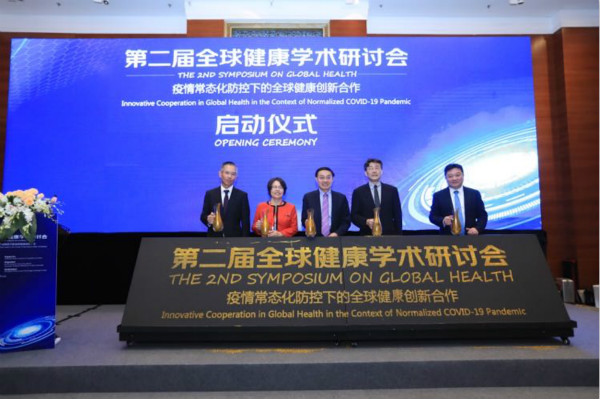Global collaboration key to ending pandemic: Public health experts

The second Symposium on Global Health is held in Shanghai, on Sept 29, 2020. [Photo provided to chinadaily.com.cn]
Gao Fu, director-general of the Chinese Center for Disease Control and Prevention and deputy director of the National Natural Science Foundation of China, said that it is clear the coronavirus is very well adapted to human beings – even better than the flu virus – and such a challenge calls for global cooperation.
"Science and technology play an irreplaceable role in eventually putting the pandemic to an end when morbidity and fatality rates drop sharply worldwide, and in face of such a pandemic, togetherness of global scientific research forces is indispensable," said Zhang Wenhong, leader of the Shanghai team of experts in the clinical treatment of novel coronavirus pneumonia cases.
Mao Ying, president of Huashan Hospital, said multilateral international collaborations here refer to the participation of countries and regions, as well as various industries and sectors.
"For example, countries can update each other on their treatment solutions and reallocate the capacity of nucleic acid testing and other medical resources. And also, clinical doctors, public health professionals, virology experts, and pharmaceutical companies should all join hands," he said.
Zhang said when to completely lift travel bans across nations and finding a balance between mobility between countries and control of the virus' spread during normal pandemic control also require the collective wisdom of different countries.
"The efficacy of the highly-expected vaccines, whether their side effects are acceptable to humans, and their popularization worldwide, are the factors that determine when the pandemic will be concluded," said Zhang, who also is director of the department of infectious diseases at Huashan Hospital.
Representatives from multilateral health organizations, including the WHO, the alliance and the coalition, as well as professors from leading public health institutes, including the Program for Appropriate Technology in Health, the University of Washington's Institute for Health Metrics and Evaluation, and the Johns Hopkins Bloomberg School of Public Health, joined the symposium online.
























